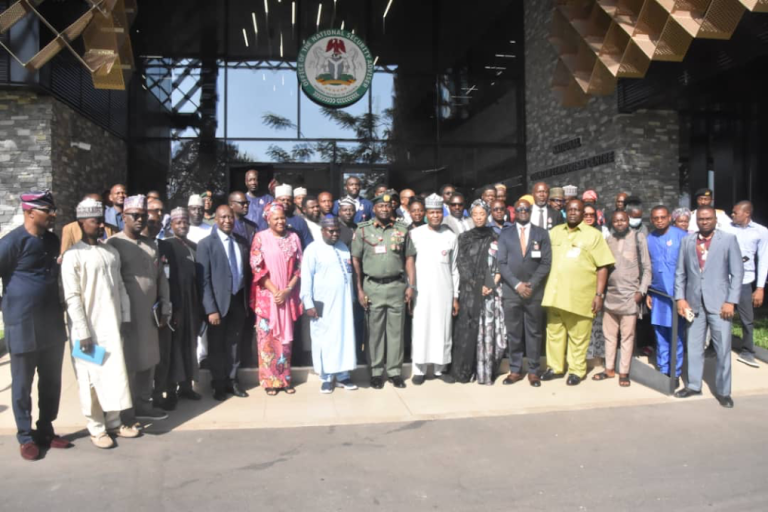From Molly Kilete, Abuja
The Chief of Defence Staff (CDS), General Christopher Musa, has again called on Nigerians not to see national security as the sole responsibility of the Armed Forces.
He said that the actions of the military in ensuring Nigeria’s national security account for only 30 per cent of the overall efforts required, while the remaining 70 per cent for maintaining Nigeria’s peace and security rests on the socio-economic elements of the country.
The CDS made this known at the Roundtable Discussion on Nigeria’s Security and National Interest organized by organised by the National Counter Terrorism Centre Office of the National Security Adviser in conjunction with the Defence Correspondents’ Association of Nigeria.
The CDS, who spoke on the theme “National Security and National Interest: A Development Journalism Approach for the Defence Beat,” noted that in a world fraught with echoes of conflict, uncertainty, security dilemmas, and ambiguous and complex geopolitical challenges, the narrative surrounding national security often emerges from a narrow lens.
According to him, “It is easy to find that the focus on national security is often skewed and confined to discussions of military strength as well as the immediate threats posed by hostile state and non-state actors.
“Although these views are essential, it is important that our understanding of national security is expanded to incorporate broader social, economic, and environmental elements, which are hallmarks of what is termed ‘development journalism.
“In a nutshell, national security entails the protection of our nation’s core values and institutions as well as citizens from both external and internal threats, while national interest involves the broad goals and objectives guiding our nation’s actions and decisions.”
Gen. Musa noted that development journalism sought to promote public awareness and understanding of defence as well as security issues while holding governments, the defence sector, and other stakeholders accountable for their actions as well as informing decision-making by policymakers and defence officials.
He further stated that the adoption of a development journalism approach allows for a more active collaboration with journalists and media organisations, enabling them to play a more effective role in promoting national cohesion and stability, thereby advancing Nigeria’s national interest.
“Therefore, our national security cannot and should not solely be reliant on the strength of the Armed Forces of Nigeria; rather, it should be strengthened by Nigeria’s educated, healthy, and socially cohesive population underpinned by development journalism.
“More so, the development journalism approach will not only require collaboration and dialogue among stakeholders; it will also focus on people centrism in the accomplishment of Nigeria’s national interest.
He said, “This approach thus resonates with my leadership concept, which is, “to nurture a professional Armed Forces of Nigeria that is people-centric, capable of meeting its constitutional responsibilities in a joint and Collaborative environment.”
Gen. Musa, while noting that the defence beat should be tailored through a development journalism lens through various options available, listed some of the options to include the continuous prioritisation of human security, adoption of investigative reporting on policy impact and the real-world implications, as well as promoting dialogue, inclusivity, and stakeholders’ engagement through available fora.
He therefore called for the need to advocate for sustainable practices through reporting on innovative practices in defence as well as using available data to tell the stories as evidence-based outcomes allow for a more informed public discourse.
The CDS, while noting that These options will engender trust and cooperation between the military, civil society and other stakeholders and enhance contextual understanding of local dynamics for enhanced social cohesion and effective collaboration, said
“Today’s occasion presents me the rare opportunity to make a statement on the critical role of the media in fostering Nigeria’s national security and defence matters, thus necessitating collaboration to further Nigeria’s national security interests.”
Earlier in his address, the National Coordinator, National Counter-Terrorism Centre, Office of the National Security Adviser, Major General Adamu Laka, who commended the media for its role in security reportage, assured the media of its continuous support and collaboration to deny the terrorist publicity.
According to him, “The objective of this roundtable discussion with you is to foster an open and insightful exchange of ideas. By sharing your experiences, observations, and challenges, together we aim to enhance collective understanding of the dynamics of terrorism and its evolving tactics, discover the ethical considerations of reporting on such sensitive issues, identify opportunities for collaboration between journalists, security experts, and policymakers, and have our best thoughts on the development of a national strategic communication plan and protocol for the gathering and distribution of news on terrorism and violent extremism with the hope of stemming threats to our national security and interests.”
